You shouldn't run on the internet, you should walk... Very quietly, taking each step so that not a single floorboard creaks under your feet. And under no circumstances should you agree to collect cookies. Otherwise, you will be tracked and pursued, harassed by targeted advertising and relevant search results. Of course, it's not scary... But it can lead to complete loss of confidentiality with subsequent data theft, and even financial resources. And the reason for such a sad outcome lies in choosing the wrong browser for internet surfing.
Every user wandering the World Wide Web, no matter how hard they try, still leaves traces... But who prevents us from confidently walking on the internet without fear of being tracked? Who needs these fingerprints? After all, this is a virtual space, free from... Confidentiality!
In our time, information about users is valued like gold. That's why there are so many people who want to spy on you. And not all of them track your actions out of mere curiosity. After all, there are few people among the trackers, and more and more services and platforms. But why do they need this data?
Who and how steals confidential user information?
Have you heard the proverb about free cheese in a mousetrap? In the situation with privacy that has developed on the Internet, users play the role of mice... Who, driven by the desire to get a tool for internet surfing for free, fall into a trap. And it snaps shut immediately after the user enters a URL in the browser's address bar. This is the end of their online privacy. Why:
- During a website visit, a small amount of data - cookies files - is stored on the user's device, which contains information about the session. And during subsequent visits, the user receives a personalized version of the web page. But in practice, along with new cookies, the server can send third-party trackers.
- Aggregated data ends up in the databases of analytical platforms, which sell them to third parties. In the best case, the information will end up in the hands of an advertising network, which will use it for targeting transmitted ads. In the worst case, it will end up in the hands of criminals. Then you can become a victim of phishing and lose your payment attributes from your bank cards... And, as a result, their contents.
And all this theft of information is carried out with the help of browsers and the silent consent of their developers. Moreover, the companies that publish this software profit from violating the privacy of users. And they also use the collected statistics for their own selfish purposes.
The most popular browser in the world, Chrome, belongs to Google. With its help, the company tracks users' actions. After that, aggregated analytics is used for targeting ads transmitted through AdWords - a contextual advertising platform that is also owned by Google.
That's why the search engine works so hard on its browser, constantly updating its user functionality. And not because Google loves all of us!
The era of fingerprints has come
In recent years, more and more non-profit organizations have started to oppose third-party cookies. Their use is even planned to be banned at the legislative level in some European countries. But this way the problem of online privacy will not be solved. Because a new, even more modern technology has emerged - digital fingerprints. They provide 90% accuracy in identifying users on the internet. To do this, fingerprints use a comprehensive approach. "Identity" is determined by a combination of multiple characteristics, the combination of which forms a unique trace specific to a particular user. These signals include:
- Technical characteristics of the device - OS, its bitness, CPU clock frequency, amount of RAM, etc.
- Local settings - language, time zone.
- Device data transmitted by the browser through the User-Agent.
As you can see, even after the prohibition of third-party cookies, the problem of privacy in browsers will not be solved. Because user identification on the World Wide Web can be successfully carried out even without them. And in this case, neither VPN services nor proxies will help.
These services only allow you to bypass blocks and view sites that are prohibited in a particular country. At the same time, they only change the IP address of the device, and they cannot replace the other parameters that make up the fingerprint.
But perhaps there are browsers that provide more anonymous internet surfing. After all, not all software publishers pursue only commercial interests. To find out, let's dive into the world of modern web browsers and choose the most worthy among them.
The most confidential browsers of our time
-
Opera
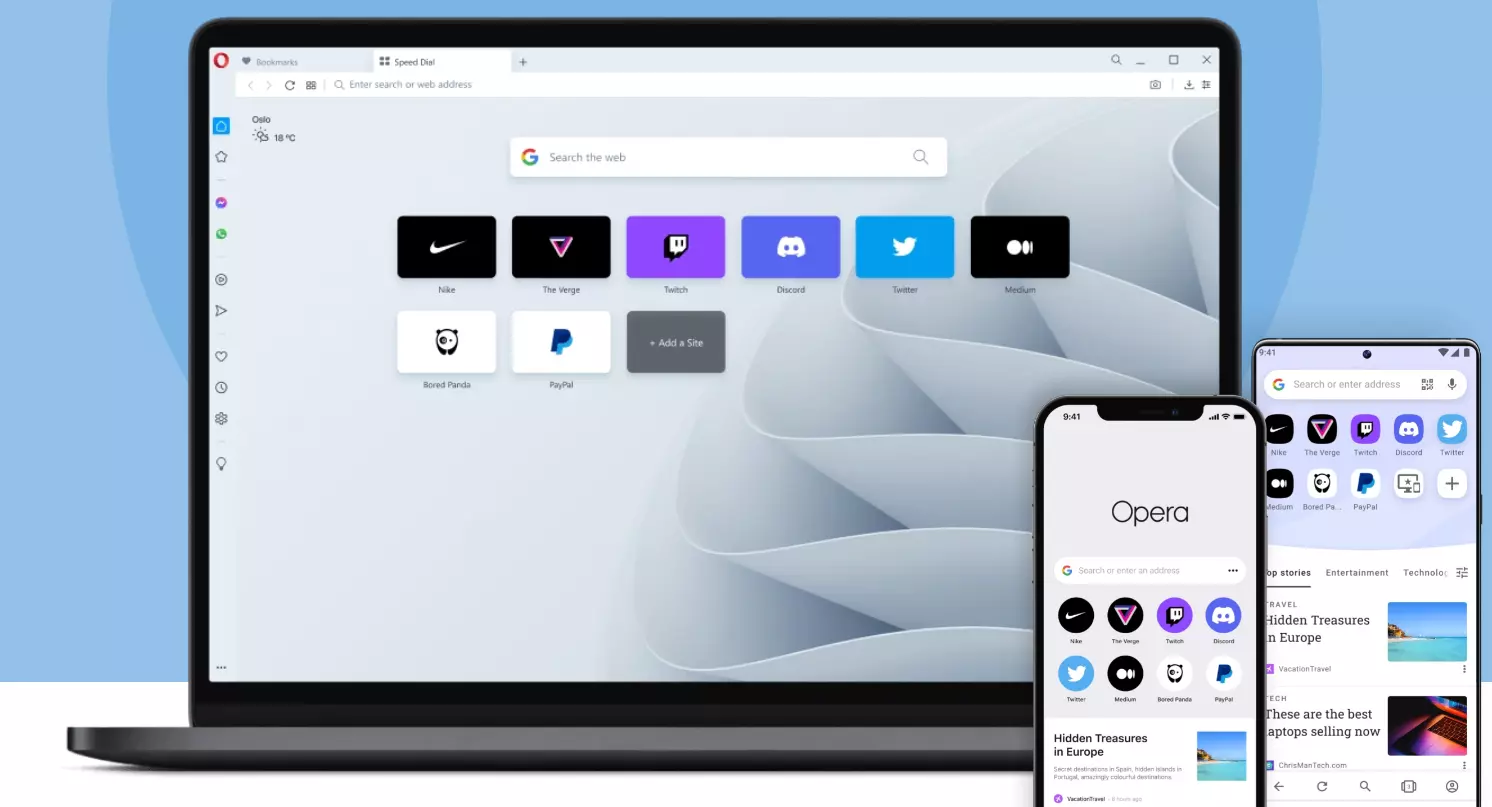
A modern browser originally published by a non-profit organization. The program is available in versions for popular desktop and mobile platforms. Comfortable page viewing is provided by the built-in ad blocker, which speeds up data loading by more than 90%. In addition, Opera includes a simple VPN that allows you to visit any websites and platforms.
But despite the presence of several privacy tools in the browser's functionality, it cannot be called the most secure web browser. In 2016, Opera was acquired by a Chinese IT company. After that, the browser began actively collecting anonymized data about its users. That is, without tying it to a person's identity.
-
Firefox

The history of Firefox began in 2002. The browser has changed its engine several times. It currently uses Quantum. Unlike Opera, this web browser collects much less information about users.
In addition, Firefox includes several tools to protect the privacy and personal data of users:
- Built-in third-party cookie blocker.
- Protection against automatic playback of videos posted on web pages.
- Social media tracker blocker.
But the presence of these tools does not guarantee anonymous surfing. Moreover, Firefox does not have a built-in VPN. Therefore, it cannot be used to visit blocked websites.
-
Brave
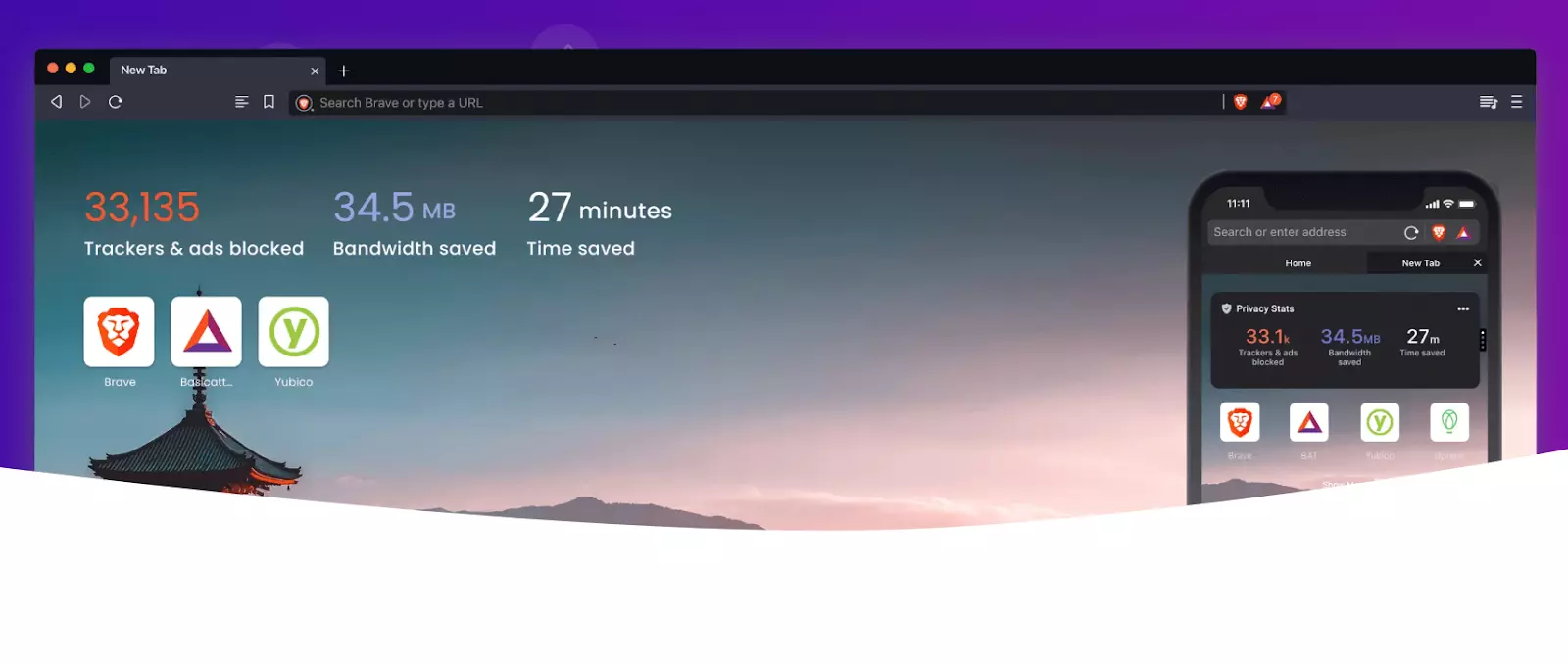
A relatively young browser published by a non-profit organization. The first release of the program was in 2016. Its main feature is a clear focus on user security. To ensure this, the browser uses several means:
- Ad blocker.
- "Incognito" mode.
- Built-in VPN service.
- Anonymous network routing.
- Protection against fingerprinting.
The functionality of Brave's protective tools is much wider than in the previously mentioned browsers. Nevertheless, even this arsenal does not guarantee complete anonymity of user activity on the internet.
-
Tor
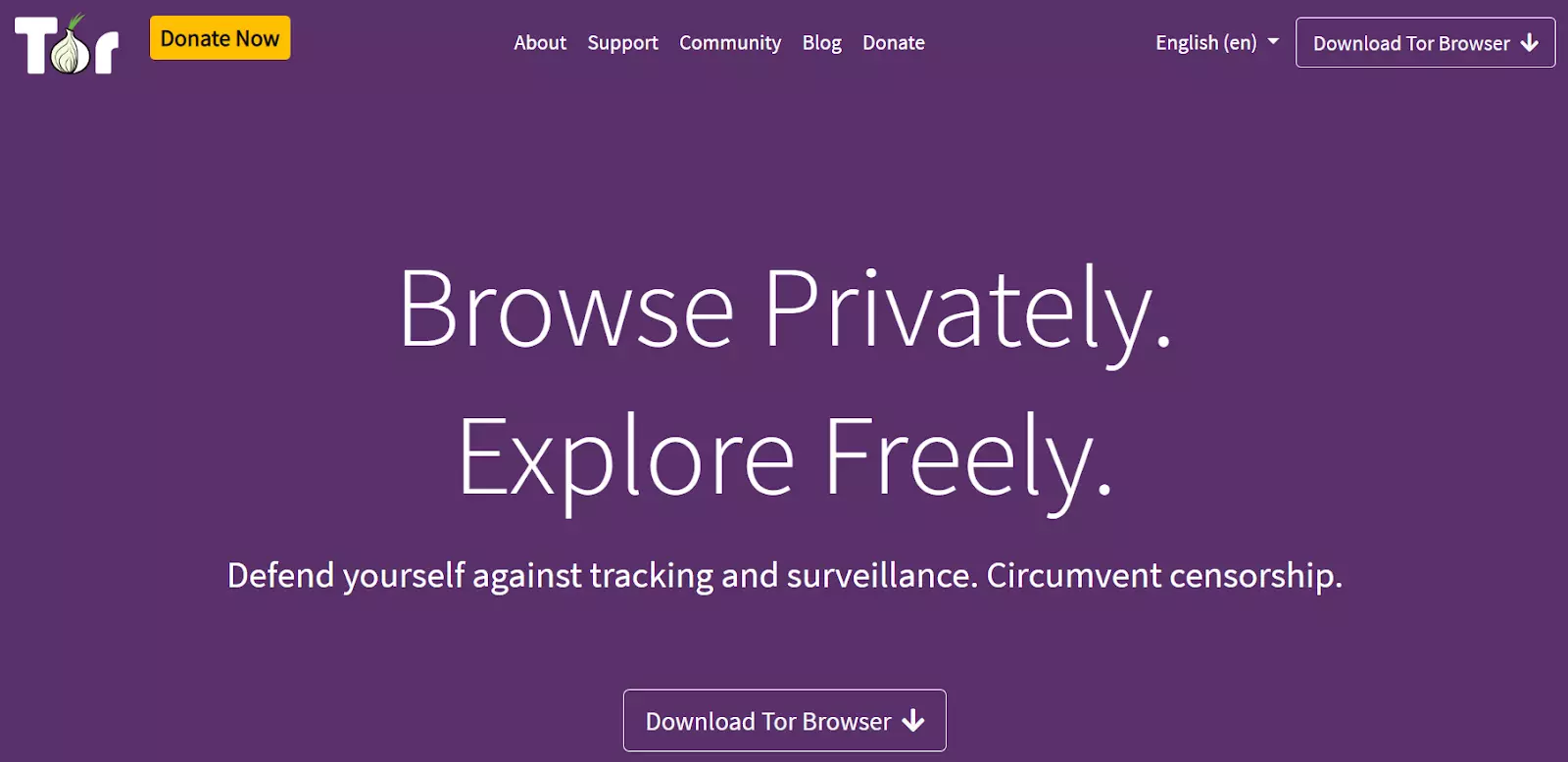
One of the most powerful solutions for ensuring anonymity on the web. The browser uses a non-standard data transmission mechanism. Tor employs the so-called "onion routing". It is a system of distributed proxy servers through which data is transmitted in encrypted form and without storing cookies. This completely eliminates the possibility of tracking user actions and identifying them through fingerprints. Because tracking systems do not receive enough information to identify the user's identity.
But due to the multiple data relays, the internet connection speed decreases. This is especially critical when using a slow mobile internet connection. As a result, web pages will load slowly. This reduces the convenience of using Tor for everyday internet surfing.
-
Epic
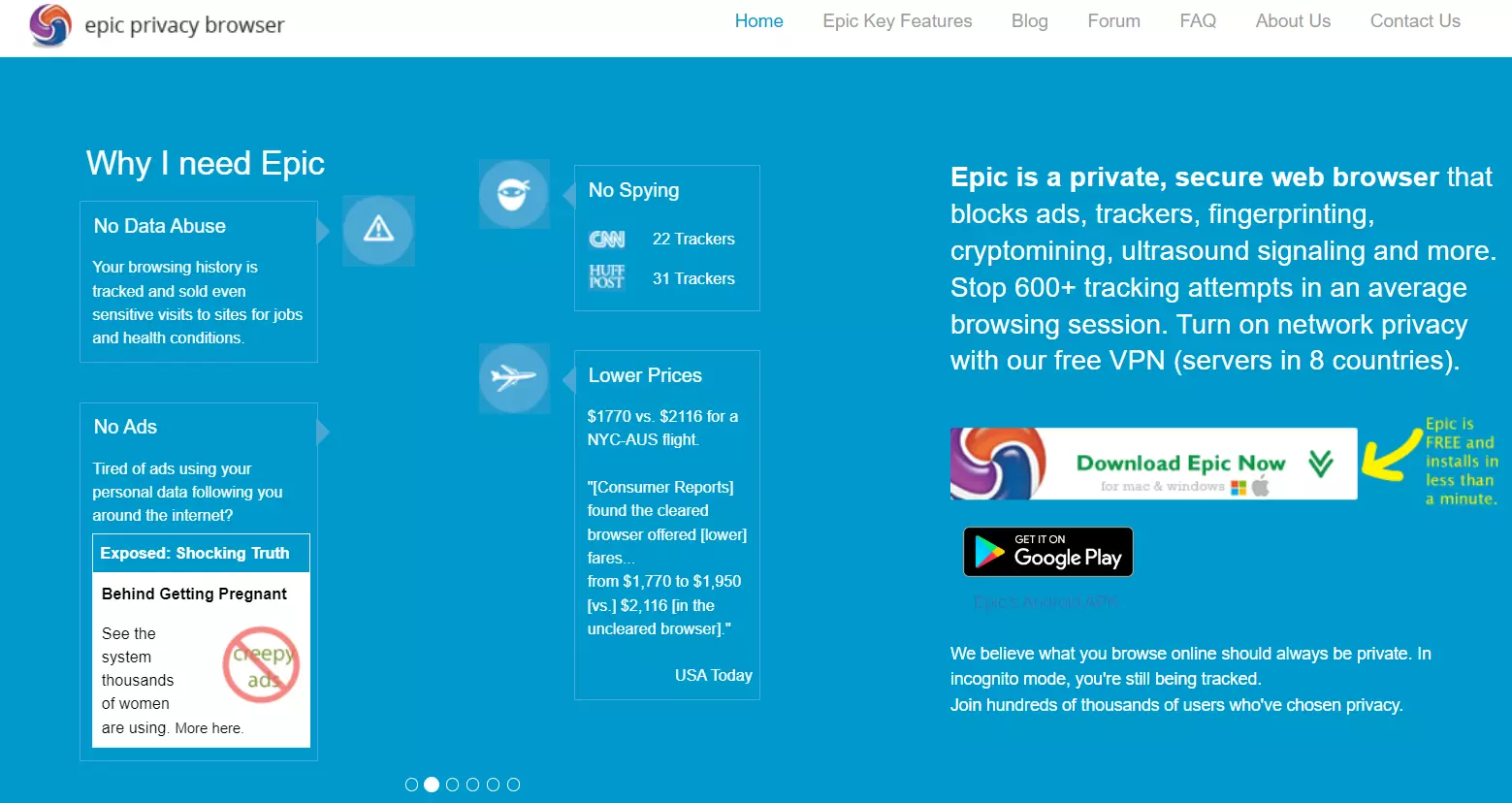
The first release of this browser was in 2010. Epic has changed its engine several times. It currently runs on the Chromium base. It is available for Windows, macOS, and Android. The features of Epic that ensure a high level of confidentiality are:
- Local storage of browsing history.
- Automatic cookie clearing.
- Third-party cookie and ad tracker blocker.
- Built-in proxy service with support for eight locations.
- Support for a limited set of browser extensions.
Epic is equipped with an impressive list of tools to protect user data. But it does not provide comfortable website browsing due to the inability to use extensions. In addition, Epic does not have an automatic update function. Therefore, the user has to manually download the new version of the program.
-
Ungoogled-chromium
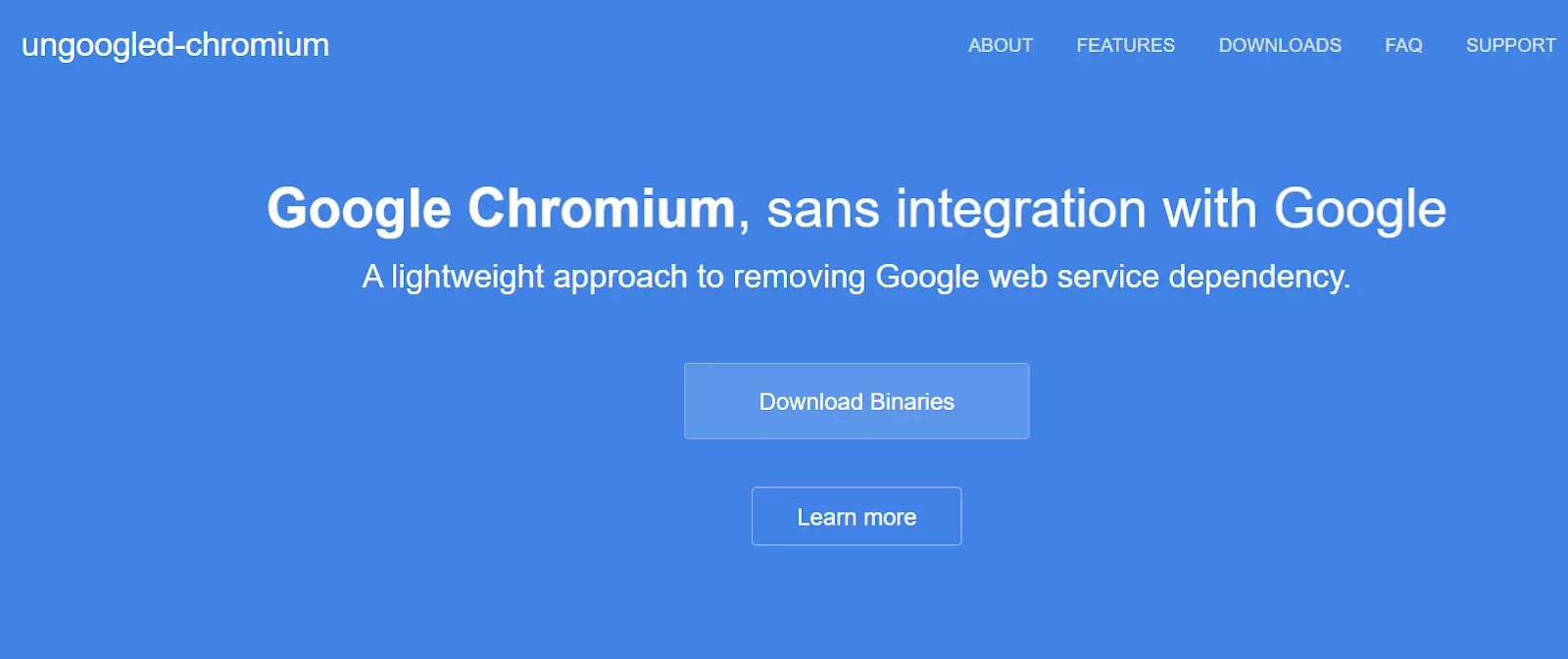
A browser that runs on the pure Chromium engine without any ties to Google services. This means that its advertising and analytics services cannot collect any data about you while browsing websites.
In addition, the browser does not store browsing history and receives daily updates. However, the updates need to be manually downloaded. Therefore, this software can only be considered as a secure alternative to the familiar Chrome for many users.
-
Undetectable
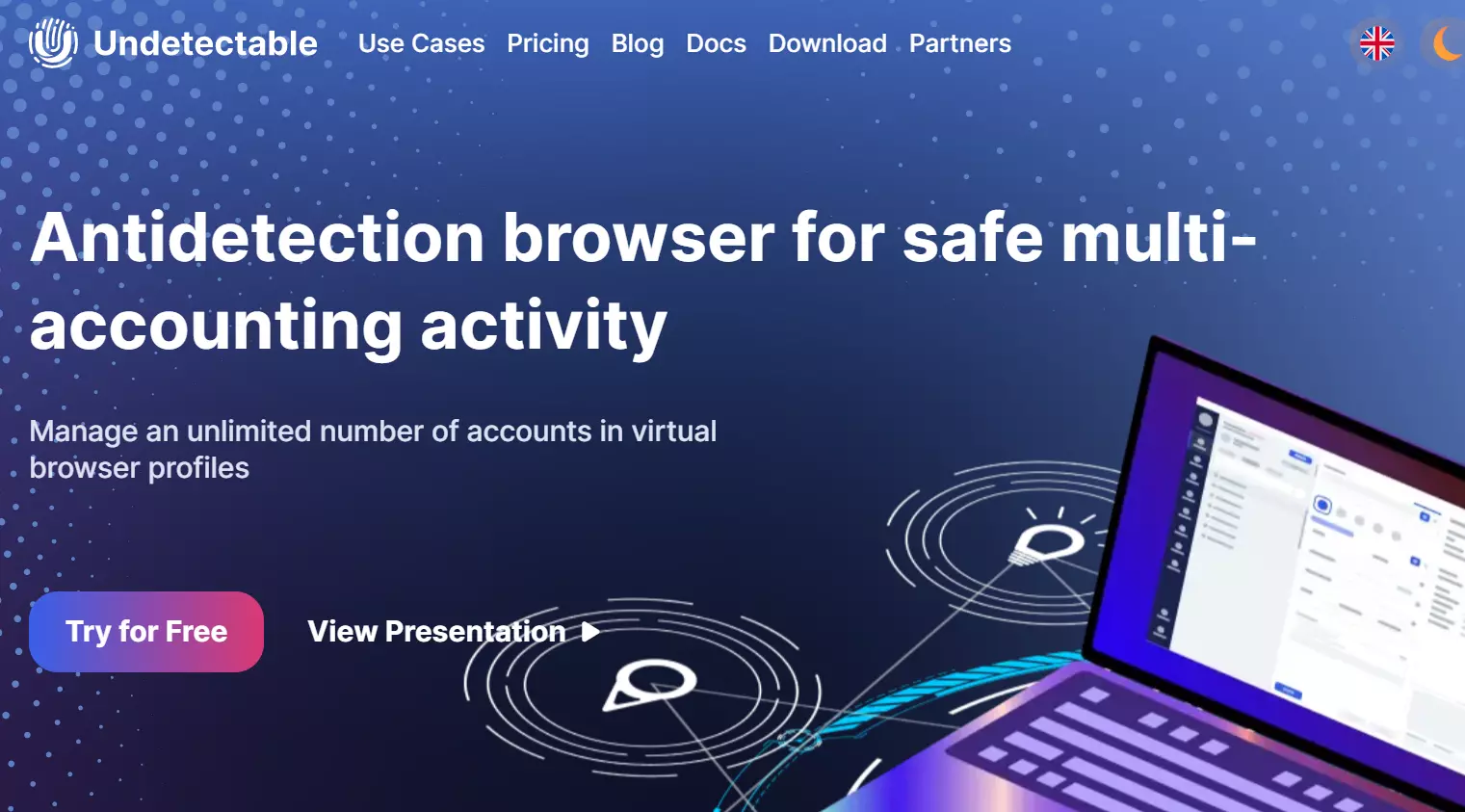
A professional anti-detection browser that uses a different approach to ensuring privacy. Unlike other browsers in the ranking, Undetectable does not block third-party cookies and trackers, but instead replaces fingerprints. This not only guarantees complete anonymity of user actions but also allows bypassing any type of block. It also enables multi-account access to any platform, including social networks, online stores, and betting services. Undetectable provides all the necessary functionality for this in the free version of the browser. This sets Undetectable apart from other anti-detection tools.
Anti-detection tools - the key to complete anonymity
Our ranking includes browsers that provide the highest level of user privacy and security. However, each of them has a number of drawbacks that reduce their effectiveness.
Anti-detection tools use a different protection mechanism - by replacing fingerprints. Therefore, they are free from these drawbacks and can not only provide a high level of anonymity but also bypass any type of block.
The only drawback of anonymous browsers is their high cost. But Undetectable is one of the few professional anti-detection tools with a fully functional free browser subscription. Therefore, the choice is obvious!



